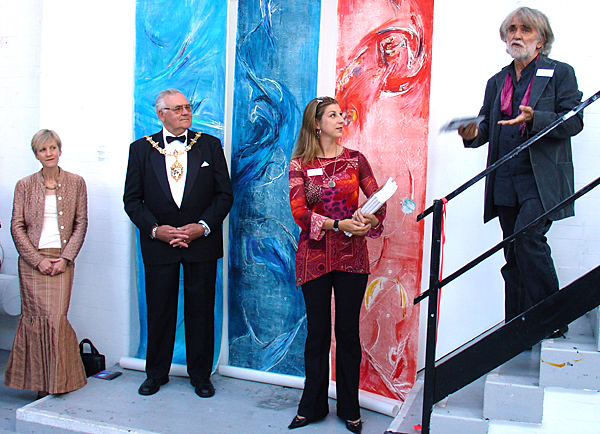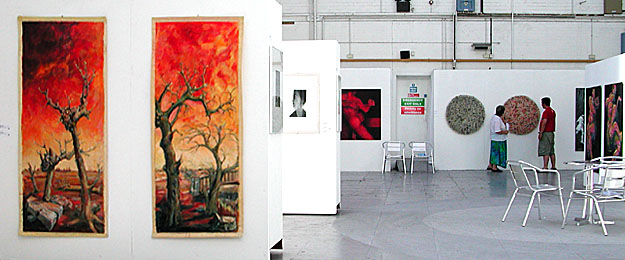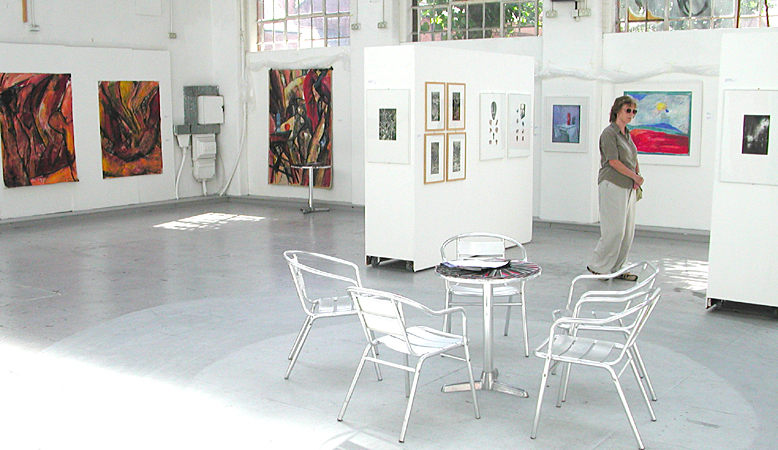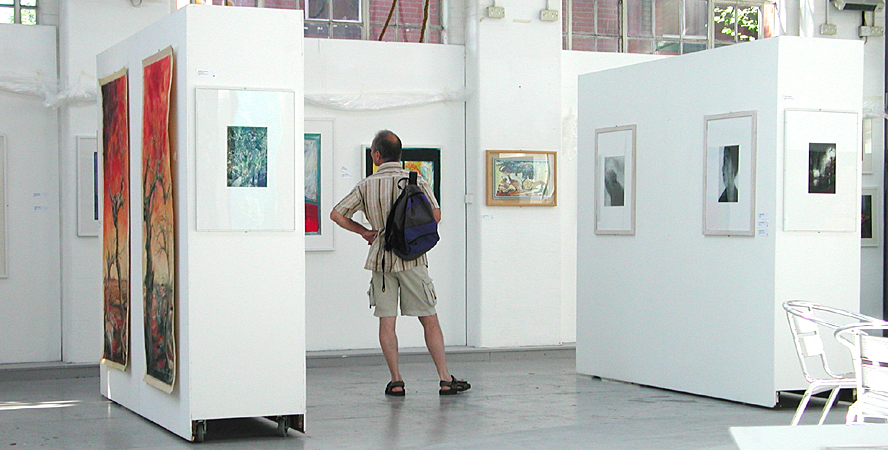

From left to right:
Prof. Shirley Pearce CBE, Vice Chancellor of Loughborough University.
The Worshipful the Mayor of Charnwood, Councillor Ken Pacey.
Dottoressa Roberta Ballestriero, Curator of the Cultural Exchange between Loughborough
Artspace and Spazio Arti Figurative "L.Lotto" of Mirano, Venice, Italy.
Prof. GianFranco, Chairman and Coordinator of Spazio Arti Figurative "L.Lotto"
of Mirano, Venice, Italy and Professor of Engraving the Academy of Fine Arts
in Venice, Italy.
This cultural exchange has been a challenging, illuminating and
very rewarding experience. The initial idea came about, over two years ago,
in a conversation with Roberta Ballestriero who wanted to find an English art
group to do an exhibition exchange with the L. Lotto group. Many months of hard
work then followed with worry over funding, and Mike Beal’s determination
and continuous form-filling finally ending in joy when the Arts Council came
up trumps. In retrospect some things could have been better, but for the most
part a fantastic opportunity has been realised. In Mirano we were given the
most generous and warmest of welcomes and we made firm friends for life. We
struggled to discuss in broken English and Italian aspects of aesthetics and
ideas. We delved into the thought processes and techniques of the Italian artists.
I watched as an Artspace Artist with dyslexia grew and blossomed in just a few
days. A change took place and the Italians nurtured, respected and encouraged
him to develop and experience new things.
La Barchessa Gallery in Mirano is grand, impressive and beautiful. We were worried
that our work wouldn’t be good enough, but the space embraced and enhanced
it. The exhibition was admired and approved.
It is now the turn of the Italians to come to Loughborough and we have great
please in welcoming them here. We are grateful to the University for the Generator
Gallery and enabling this exhibition to take place. Loughborough can’t
compete with Venice! The space is not beautiful or grand but it is no less impressive
and I hope that this large industrial setting will lift and inspire the Lorenzo
Lotto artists as did the Barchessa for Artspace.
The cultural exchange exhibitions now conclude but hopefully the relationship
between the two groups will not end. I know that for me I have a home in Mirano
and they have inspired my art, given me hope and have definitely found a place
in my heart.
Helen A. Ward
Without Helen Ward’s vision, enthusiasm, courage and sheer determination this exchange would never have happened. Everyone involved owes a huge debt of gratitude to Helen.
Mike Beal

The most important initiatives and the most fruitful collaborations often arise from an everyday situation. A meal with friends, a general flow of conversation, and one discovers that, thousands of kilometres away, other countries conceal people with the same passion, the same energy, and the same yearning to convey their own inner world through their art. Thus, simply from a pleasant evening spent at Helen’s house, emerged the idea of organising this cultural exchange between Artspace and the ‘Lorenzo Lotto’ Art Association.
It has been delightful to discover how many similarities exist
between the two groups, composed as they are of such diverse artistic personalities.
Clearly different also are the exhibition spaces which have hosted the works
of these artists, but it is above all the history of these spaces which is different.
At Mirano, an area of numerous residences of the Venetian aristocracy, the English
group has exhibited its work in the prestigious hall that is the eighteenth
century Barchessa, or boatstore, of the Villa Morosini - XXV Aprile; whilst
in Loughborough the works of the Italian group are confronted by the interesting
industrial space of the Generator Gallery.
The barchessa began as a building annexed to the main house and
was where agricultural tenants used to store their implements and bundles of
hay; this Miranese building was subsequently transformed to house the carriages
and boats of Venetian noble families when they used to come to their villas
to spend their summer holidays on the mainland.
The Generator Gallery has a very different history given that it was originally
built to house the generators for the electricity system of the engineering
college which was founded in Loughborough in the early twentieth century. It
would seem that part of the plant came from the diesel motors of submarines
captured in the 1st World War and subsequently dismantled in Portsmouth.
It is fascinating to observe how art has succeeded in de-contextualising and uniting two buildings with a past so different and yet almost forgotten. Two sites, whose walls are steeped in history, evoke, in a play of opposites -the old and the new, the rural and the industrial - distant memories of different identities.
Thus it is from different countries that our artists come, but they, however, recalling to mind great Venetian and English travellers, are once again spurred to travel, to discover and to encounter, and have given new life to the walls of these halls with their diverse… Identities.
Roberta Ballestriero
Curator of this Cultural Exchange.

The cultural association ‘L. Lotto’ is active in the
artistic and cultural field with regular beginners, refresher and specialist
courses, as well as seminars, conferences and exhibitions. Under the patronage
of the Municipality of Mirano and linked to the Centre for Cultural Initiative
since 1st March 1980, the Association is a non profit-making organisation which
tries to foster and study themes linked to the arts of drawing, painting and
printmaking and to the increase of knowledge of cultural and other allied subjects.
It is open to all who, as an alternative to an official course, are interested
in learning all techniques linked to the figurative arts and to those who wish
to equip themselves with knowledge and professional skills while focusing on
their own professional and artistic choices.
The works of the members of the ‘Lorenzo Lotto’ now in England present
the opportunity, falling as it does in the 25th year of the Association’s
existence, for realising one of the principal objectives of the Association
and school: the dialogue with spheres more diverse and much more distant from
the confines of the oasis that is Mirano.
One can discuss forever the value of the word ‘art’ but undeniably
the work, for those who research with passion in such a field, one defines above
all as a message issued as the result of an encounter. This message, with a
definite affirmative, has already been realised with success for the first time
last October with Artspace’s exhibition in the spaces of the Villa Morosini-Giustinian
in Mirano.
The return now with ‘Italian Identities’ at the Generator Gallery
leads one to hope that this event may convey to the English public something
special and unknown such as can be reflected in the future of this rapport,
happily begun between the two groups, in which, and to which, Roberta Ballestriero
has believed and has contributed so much.
Specifically I would like to underline what has already been said by the artist
and art critic Mariangela Tiozzi (head of cultural activities in the Department
of History of Art and the Conservation of Artistic Assets at the Ca’ Foscari
University, Venice) on the clear diversity of this ensemble of works: some linked
to the persistence of a most exquisitely pictorial tradition, others to an inexhaustible
research into new means of expression.
This explains how works produced with new materials and on video appear with
several works of still life and many prints. This testifies, in my view, to
the basic and formative value of the former as the absolute basis for the development
of every modern pictorial language and the second as a confirmation of how important
a centre Venice has been for printmaking during her history and perhaps through
the printing process the Italian city nearest to the rest of Europe.
Gianfranco Quaresimin,
President and Co-ordinator of the Spazio Arti Figurative ‘L’Lotto’.

Writing this text has given me a splendid opportunity to browse
among the ‘Lorenzo Lotto’ archives and to run through its history.
Intense is the emotion that I experience in remembering those shared moments:
the ‘battle’ with local government to obtain our present workshops,
participating in the yearly courses, cultural meetings, exhibitions. In particular,
however, this occasion has given me the time to bring to mind the numerous initiatives
which the Miranese Association has undertaken in 25 years of activity and the
spirit which has sustained and animated it: especially, so as to avoid the danger
of being inward looking, by looking for cultural synergies, not only with the
local population, but also involving other spheres, in order to achieve an analysable
exchange of experiences. The cultural activities have, in fact, always been
open to the public, likewise the lectures in the History of Art, the guided
visits to exhibitions and museums, the cineforum, the workshop activities for
school-children, and the painting prizes (in collaboration with Hammeley and
Co.). The boundaries have widened more and more- the realization of the International
Biennale of Contemporary Engraving at the Villa XXV Aprile in Mirano, and now
the association with Artspace- thanks to the many who believe in the potential
of the Association, people like Roberta Ballestriero, a dedicated and far-sighted
enthusiast. At the core lies the work of our President- also our teacher and
co-ordinator- Gianfranco Quaresimin who has generously always supported and
stimulated collaborative enterprises as well as teaching each of us to express
our own creativity while improving our artistic analysis.
The enthusiasm which spurs the artists of the Association would not alone be
enough to guarantee the excellent results obtained if they had not been accompanied
by a period of reflection upon the meaning of our own work and on the coming
together of different artistic languages which denotes the multi-faceted world
of art of today.
Many are the artists who have passed through the ‘Lorenzo Lotto’,
diverse in age, culture and goal – creating a rather heterogeneous fabric,
but, and herein lies its beauty, one of a solid artistic structure. As this
exhibition illustrates, some have taken a personal self-exploration course,
whilst others have chosen a more traditional path. Nevertheless there remains
an indelible magic fil rouge which reappears in us on every occasion, whether
it be an event, an exhibition, or quite simply a social get-together.
Both Artspace and Spazio Arti Figurative ‘Lorenzo Lotto’, curiously
linked as they are by the same name, have parallel intentions and are examples
of how small entities, born on the flank of formal institutions, are able to
involve a wide public by offering extremely stimulating artistic ideas in diametrically
opposed settings: Artspace, permitted to use an industrial exhibition space
in Loughborough, and the ‘Lorenzo Lotto’ a period villa in Mirano.
Maria Angela Tiozzi